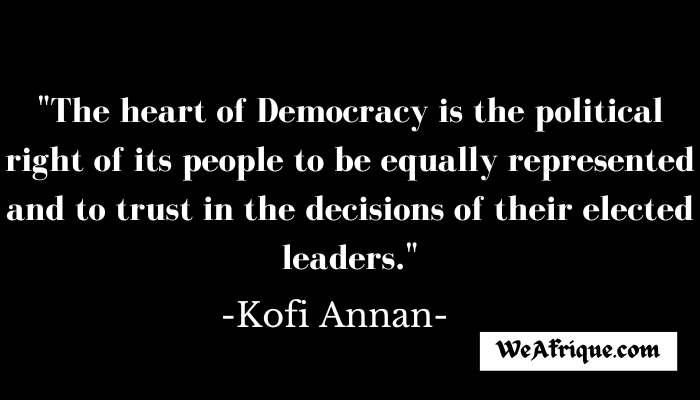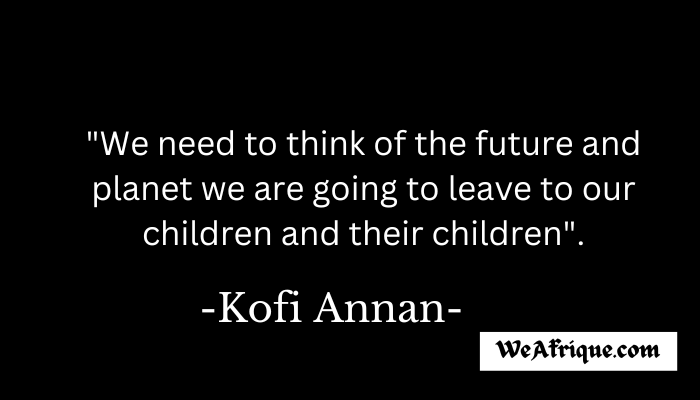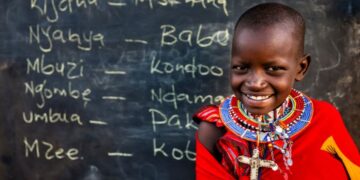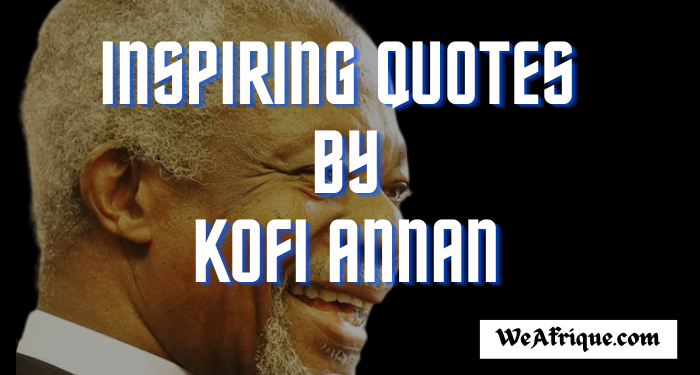Kofi Annan was known for his eloquent speeches and insightful quotes on various topics related to international relations, human rights, and sustainable development. His words have inspired and influenced people worldwide, and his legacy as a leader and a humanitarian continues to be celebrated even after his passing in 2018.
Annan was a Ghanaian diplomat who served as the seventh Secretary-General of the United Nations from 1997 to 2006. During his tenure, he played a significant role in shaping the UN’s response to global challenges, including the HIV/AIDS epidemic, the Iraq War, and the establishment of the Millennium Development Goals.
Kofi Annan’s Fascinating Quotes on Peace, Justice, Conflict, and Reconciliation
1. We all want peace. But, peace is a complex process. I believe that lasting peace requires reconciliation.
2. The parallel pursuit of justice and peace does present challenges, but they can be managed. We must be ambitious enough to pursue both, and wise enough to recognize, respect, and protect the independence of justice.
3. Peace is never a perfect achievement.
4. My advice is that we must be ambitious enough to pursue both justice and peace, and wise enough to know when and how to do so.
5. In the rush for justice it is important not to lose sight of principles the country holds dear.
6. Conflict is often caused by having unequal access to political power; it follows that a good way to avoid conflict is to encourage inclusive democracy, which gives everyone a say in decisions that affect their lives.
7. No dispute is so entrenched that it cannot be overcome, and enmity between peoples need not last forever.
8. Justice has taken its course and the authority and legitimacy of the legal process must be respected.
9. We must accept that the solution to today’s wars and conflicts must be political; the force of arms is not the answer.
10. Reconciliation means different things to different people because individuals and communities are affected by violence and peace in different ways.
11. Nothing can be more dangerous to our efforts to build peace and development than a world divided along religious, ethnic, or cultural lines. In each nation, and among all nations, we must work to promote unity based on our shared humanity.
12. In the rush for justice it is important not to lose sight of principles the country holds.
13. All of us, not only Presidents and generals, must play a role in building peaceful and stable communities; and that we cannot be innocent bystanders.
14. I often quoted an African proverb that says: ‘The world is not ours, the Earth is not ours, It’s a treasure we hold in trust for future generations’. And I often hope we will be worthy of that trust.
15. We must uphold the principles of dialogue and tolerance. Without them, there is no peaceful exchange of ideas, no way to bring people together, and no chance of arriving at mutually agreed solutions.
16. The battle for freedom and justice is never hopeless, but it is never finally won. Every morning, we must wake up ready to fight it again.
Kofi Annan’s Quote On Democracy, Elections, and Political leaders
17. Democracy depends on the lively participation of organized civil society in Political life. Politics is too important to be left only to Politicians.
18. Democracy is not just about elections, rather, democracy is first and foremost about laws and institutions that guarantee the rights of its citizens and respect and even protect religious freedom.

19. The heart of Democracy is the political right of its people to be equally represented and to trust in the decisions of their elected leaders.
20. Citizens must believe that they are their nations’ own agents of change and that the ballot box is their strongest tool.
21. The will of the people must be the basis of governmental authority. That is the foundation of democracy. That is the foundation of good governance.
22. Politics is too important to be left only to politicians alone. And elections are the key moments in political life since they are the foremost mechanisms for peaceful and democratic rotation of leadership.
23. Credible elections have to meet three essential criteria: inclusiveness, transparency, and accountability. That is only the way to earn the trust of the competitors and the public.
24. The will of the people must be the basis of governmental authority. That is the foundation of democracy. That is the foundation of good governance.
25. Good elections are the best answer to the violence that aims to deprive the citizens of their right to choose their leaders – national and local – free of intimidation. Elections provide a moment for citizens to come together to debate and decide who will lead them, and for what purpose, and to renew their commitment to the democratic ideal.
26. No one is born a good citizen; no nation is born a democracy. Rather, both processes that continue to evolve over a lifetime. Young people must be included from birth. A society that cuts off from its youth severs its lifeline.
27. Democracy is, in essence, a form of non-violent conflict management. If war is the worst enemy of development, healthy and balanced development is the best form of conflict prevention.
28. Elections are at the heart of democracy. When conducted with integrity, they allow citizens to have a voice in how and by whom they are governed. This is because while human beings need security and livelihoods, they also need freedom, dignity, and justice.
29. To deepen democracy elections cannot just be lip service that undemocratic leaders pay to their people.
30. Leaders who hang on to power indefinitely by gaming elections and suppressing criticism and opposition are sowing the seeds of violence and instability.
31. Deepening our democracy is a crucial struggle, not just for our future prosperity and peace, but also for our fundamental human aspiration to live as free men and women. At the end of the day, what matters is not so much which candidate or which party wins an election, as long as the country wins.
32. The evolution and strengthening of effective, transparent, accountable, and responsive government, subject to the rule of law, is a condition for sustainable development, not a result of it.
33. If information and knowledge are central to democracy, they are conditions for development.
34. My own advice to people who would be in office for two or three terms is that they must accept democratic rotation. Ideally not put themselves up for re-election and allow the system to work.
35. I remain a committed believer in the value of democracy as a catalyst for better governance, greater security, and human development. The spread of democracy has been one of the most profound and positive developments that I have witnessed over my career.
36. We must make democratic systems more effective, and more responsive to the needs of average citizens. And in the face of growing cynicism toward democracy, we must not yield but defend and champion the values and virtues of democracy.
37. I have always believed that on important issues, leaders must lead. When the leaders fail to lead, and people are really concerned about it, they will take the lead and make the leaders follow.
38. Today more than ever, we need far-sighted leaders who can see beyond their national boundaries and beyond the next election.
Annan’s Quotes on Education and Youth
39. Education is, quite simply, peace-building by another. It is the most effective form of defense spending there is.
40. Education is a human right with immense power to transform. On its foundation rest the cornerstone of freedom, democracy, and sustainable human development.
41. Knowledge is power. Information is liberating. Education is the premise of progress, in every society in every family.
42. Literacy unlocks the door to learning throughout life, is essential to development and health, and opens the way for democratic participation and active citizenship.
43. Education is the great equalizer of our time. It gives hope to the hopeless and creates chances for those without.
44. For everyone, everywhere, literacy is along with education in general, a basic human right.
45. We need to think of the future and planet we are going to leave to our children and their children.

46. Literacy is a bridge from misery to hope.
47. Young people should be at the forefront of global change and innovation. Empowered, they can be key agents for development and peace. If, however, they are left on society’s margins, all of us will be impoverished. Let us ensure that all young people have every opportunity to participate fully in the lives of their societies.
48. You are never too young to lead and you should never don’t your capacity to triumph where others have not.
49. Have confidence in young people, give them a chance, and they will surprise you.
50. Children are our future and if we use them in battle, we are destroying the future. We must reclaim them, every one of them, one at a time.
51. Unfortunately, very few governments think about youth unemployment when they are drawing up their national plans.
52. You have to wake up every day ready to start again.
53. I am not afraid to dream. You first have to start with a dream. Build your castle in the air and give it a foundation. Without a dream, you are not going anywhere.
54. Any society that does not succeed in tapping into the land energy and creativity of its youth will be left behind.
55. Young people must be included from birth. A society that cuts itself off from its youth severs its lifeline; it is condemned to bleed to death.
56. Ignorance and prejudice are the handmaidens of propaganda. Our mission, therefore, is to confront ignorance with knowledge, bigotry with tolerance, and isolation with the outstretched hand of generosity. Racism can, will, and must be defeated.
57. Literacy is, finally the road to human progress ad the means through which every man, woman, and child can realize his or her full potential.
Read Also: 50 Powerful Kwame Nkrumah Quotes
Quotes on Human Rights and Gender Equality.
58. Gender equality is more than just a goal in itself. It is a precondition for meeting the challenge of reducing poverty, promoting sustainable development, and building good governance.
59. We may have different religions, different languages, and different colored skin, but we all belong to one gunman race.
60. … There is no tool for development more effective that the empowerment of women.
61. When women thrive, all of the social benefits and the succeeding generations are given a better start in life.
62. … lets us continue to work together to develop and nurture in future generations a culture of human rights, to promote freedom, security, and peace in all nations.
63. International law now grants rights to all human beings not only to citizens.
64. We need to create a world that is equitable, that is stable, and a world where we bear in mind the needs of others, and not only what we need immediately. We are all in the same boat.
65. A developed country is one that allows all its citizens to enjoy a free and healthy life in a safe environment.
66. We need to promote greater tolerance and understanding among the people of the world. Nothing can be more dangerous to our efforts to build peace ad development than a world divided along religious ethnic or cultural lines. In each nation, and among all nations, we must work to promote unity based on our shared humanity.
67. There is no development strategy more beneficial to society as a whole – women and men alike – than the one which involves women as central players.
68. Violence against women is perhaps the most shameful human rights violation, and it is perhaps the most pervasive. It Knows no boundaries of geography, culture, or wealth. As long as it continues, we cannot claim to be making real progress toward equality and the development of peace.
69. Access to safe water is a fundamental human need and therefore a basic human right.
70. A citizen of the world in the fullest sense – one whose vision and culture gave him a deep empathy with fellow human beings of every creed and color.
71. To build a more healthy, peaceful, and equitable world the classrooms of the world have to be full of girls as well as boys.
72. More countries have understood that women’s equality is a prerequisite for development.
73. We are not only all responsible for each other’s security. We are also, in some measure, responsible for each other’s welfare.
74. In the 21st century, I believe the mission of the United Nations will be defined by a new, more profound awareness of the sanctity and dignity of every human life, regardless of race or religion.
75. It is my aspiration that health finally will be seen not as a blessing to be wished for, but as a human right to be fought for.
Globalization and Societal Change
76. We have to choose between a global market driven only by calculations of short-term profit, and one which has a human face.
77. Our biggest challenge in this new century is to take an idea that seems abstract – sustainable development – and turn it into a reality for all the world’s people.
78. It has been said that arguing against globalization is like arguing against the laws of gravity.
79. In an age where community involvement and partnership with civil society are increasingly being recognized as indispensable, there is clearly a growing potential for cooperative development and renewal worldwide.
80. Poverty devastates families, communities, and nations. It causes instability and political unrest and fuels conflicts.
81. Healthy and sustainable societies are based on three pillars: peace and security, sustainable development, the rule of law, and respect for human rights. There can be no long-term security without development; there can be no long-term development, without security, and no society can long remain prosperous without the rule of law and respect for human rights.
82. The challenge now is to ensure economic development eradicates poverty, while reducing inequality and promoting environmental sustainability.
83. We need to stop seeing development assistance as the rich giving a hand-out to the poor and put in place a genuinely universal compact where we work together to increase incomes and opportunity for all.
84. We must remember that cohesive and healthy societies rest on three pillars – peace and security, development, the rule of law, and respect for human rights.
85. Economic development must combat poverty and inequality in the long term and make tangible improvements in people’s livelihoods in the short term.
86. We can and must provide equitable access to sustainable development, particularly for those developing countries that are poised for their greatest growth. They have to be supported financially and technically to mitigate and adapt to climate change.
87. The path to greener economies and more sustainable development lies through partnerships with others.
88. I am confident that by working in close partnership across all sectors and by building nutrition-sensitive, sustainable, and climate-resilient food systems, we can achieve the SDG goal of ending malnutrition by 2030.
89. Now it is hard to imagine a world without modern transport. Transport drives economic and social development. Transport connects people to jobs, health services, and education and keeps the wheels of commerce turning.
90. We must also avoid the trap set by extremists of limiting human beings to one identity. We all have multiple identities which enrich us as individuals.
91. Globalization is a fact of life. But I believe we have underestimated its fragility.
92. Business, labor, and civil society organization have skills and resources that are vital in helping to build a more robust global community.
93. Insecurity is love dressed in a child’s clothing.
94. We cannot wait for governments to do it all. Globalization operates on internet time. Governments tend to be slow-moving by nature because they have to build political support for every step.
95. We can thrive in our own tradition, even as we learn from others, and come to respect their teachings.
96. What governments and people don’t realize is that sometimes the collective interest – the international interest is also the national interest.
97. The happiness of any society begins with the well-being of the families that live in it.
98. Microfinance is an idea whose time has come.
99. Let us be good stewards of the Earth we inherited. all of us have to share the earth’s fragile ecosystem and precious resources, and each of us has a role to play in preserving them. If we are going on living together on this earth, WWE must all be responsible for it.
Other Quotes by Kofi Annan
100. The lord had the wonderful advantage of being able to work alone.
101. We need to keep hope alive and strive to do better.
102. We can love what we are, without hating what, and who, we are not.
103. Without a dream, you’ll not get anywhere.
104. I urge you to celebrate the extraordinary courage and contributions of refugees past and present.
105. The future belongs to you, but it can only belong to you if you participate and take charge.
106. I am not afraid to dream. You first have to start with a dream. Build your castles in the air and give it a foundation. Without a dream, you are not going to get anywhere.
107. Drugs have destroyed many lives, but wrongheaded governmental policies have destroyed many more. I think it’s obvious that after 40 years of the war on drugs, it has not worked. There should be decriminalization of drugs.
108. If one is going to err, one should err on the side of liberty and freedom.
109. Landmines are among the most barbaric weapons of war because they continue to kill and maim innocent people long after the war itself has ended. Also, fear keeps people off the land, and thus prevents them from growing food.
110. We have the means and capacity to deal with problems if only we can find the political will.




















